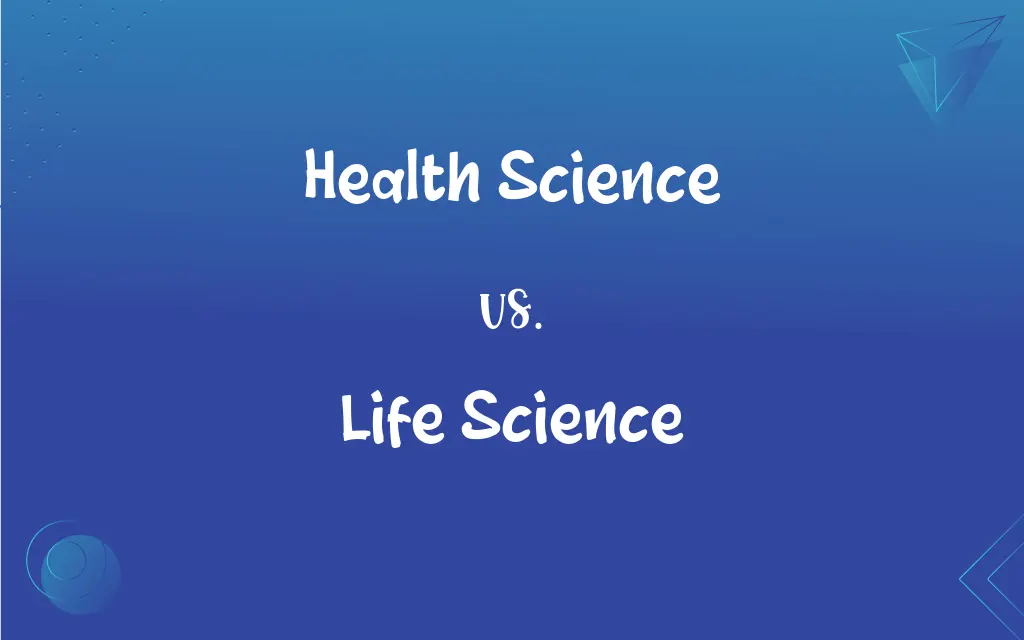Health Science vs. Life Science: What's the Difference?
Edited by Aimie Carlson || By Janet White || Published on October 23, 2023
Health Science focuses on the study and research of human health and medical treatment, while Life Science explores the biology and mechanisms of all living organisms, including plants, animals, and microorganisms.

Key Differences
Health Science primarily delves into the well-being of humans. It encompasses areas such as medicine, pharmacy, nursing, and public health. Life Science, on the other hand, casts a wider net, studying all forms of living organisms, from the smallest bacteria to the largest animals.
Health Science is often applied in nature. When a student engages with Health Science, they're likely aiming for professions that involve treating or studying human ailments. Life Science, conversely, might lead someone down a path of researching plant genetics, animal behavior, or cellular biology, amongst other fields.
Health Science frequently involves interacting with patients, diagnostics, and therapeutic treatments. In contrast, Life Science may often be more research-intensive, focusing on understanding the intricacies of life, evolution, and the relationships between various species.
Institutions and industries around the world differentiate between Health Science and Life Science in their research departments, educational programs, and professional sectors. For instance, a pharmaceutical company might have both a Health Science division focusing on drug development and a Life Science division looking at genetic research.
To sum up, Health Science and Life Science are interrelated but distinct fields. While Health Science zeroes in on human health and medical treatment specifics, Life Science takes a broader approach, delving into the mysteries of all living organisms across our planet.
ADVERTISEMENT
Comparison Chart
Main Focus
Human health and medical treatments.
Biology of all living organisms.
Typical Study Areas
Medicine, nursing, pharmacy, public health.
Botany, zoology, genetics, ecology.
Application
Often directly applied in clinical settings.
Broad research and understanding of life.
Career Prospects
Doctors, nurses, therapists, health administrators.
Biologists, ecologists, geneticists, teachers.
Relationship to Humans
Directly related to human health.
Studies all living beings, including humans.
ADVERTISEMENT
Health Science and Life Science Definitions
Health Science
The structured investigation of health and the human body to further knowledge and enhance care.
Advances in Health Science have greatly increased the average human lifespan over the past century.
Life Science
The systematic exploration of life in all its forms and complexities.
From the smallest microorganisms to vast ecosystems, Life Science seeks to understand it all.
Health Science
A field that bridges medical knowledge with skills to implement healthcare and treatments.
Many students are drawn to Health Science because they want to make a tangible difference in patient care.
Life Science
The study of the biology and functioning of living organisms.
Life Science explores the wonders of everything from plants to primates.
Health Science
An interdisciplinary field drawing on both pure and applied sciences to promote human health.
Health Science combines elements of biology, chemistry, and social science to understand health dynamics.
Life Science
A branch of science delving into the mechanisms, behaviors, and interactions of living entities.
Life Science research has shed light on how diverse species have evolved over time.
Health Science
A domain dedicated to the betterment of human health through research, practice, and application.
Without Health Science, many modern medical practices would not exist.
Life Science
A field of study focusing on the biological aspects and principles of living things.
Life Science plays a crucial role in understanding our world's biodiversity.
Health Science
The discipline studying the application of medical, physical, and social knowledge to improve health and prevent illness.
Health Science professionals work tirelessly to find better treatments for diseases.
Life Science
The academic and research discipline encompassing the vast spectrum of living organisms.
Thanks to Life Science, we have insights into the intricate web of life on Earth.
FAQs
Can Life Science be applied to medical research?
Absolutely, especially in areas like genetics, cellular biology, and pharmacology where the biology of living organisms is key.
Is public health a part of Health Science?
Yes, public health, which deals with the well-being of communities and populations, is an integral aspect of Health Science.
What professions are associated with Health Science?
Professions such as doctors, nurses, therapists, health administrators, and medical researchers are rooted in Health Science.
What subjects do students typically study in Life Science?
They study subjects like botany, zoology, microbiology, genetics, and ecology, among others.
How does Life Science contribute to understanding human evolution?
Through subjects like genetics, paleontology, and anthropology within Life Science, we gain insights into human evolutionary history.
How does Life Science differ from Health Science?
Life Science studies all living organisms, including their biology and processes, while Health Science specifically targets human health and medical care.
Which field might delve into the study of diseases?
Both fields. Health Science may study diseases in the context of human health, while Life Science could study diseases affecting various organisms.
Can someone with a background in Health Science transition to a Life Science field?
Certainly, given the overlapping knowledge areas, especially in subjects like genetics, cellular biology, and physiology.
What is the primary focus of Health Science?
Health Science focuses on understanding, improving, and maintaining human health through research, study, and application.
How have advancements in Health Science impacted our lives?
Health Science advancements have led to better medical treatments, increased lifespan, disease prevention, and overall improved health.
How are pharmaceutical studies related to these fields?
Pharmaceutical studies are often at the intersection of both, using Life Science for drug discovery and Health Science for drug application and therapy.
Is the study of animal biology included in Life Science?
Yes, animal biology, including the study of their anatomy, behavior, and ecosystems, is a crucial part of Life Science.
In which field might one study human anatomy in detail?
While both fields touch on it, Health Science would dive deeper into human anatomy, especially in clinical and medical contexts.
Are environmental studies a part of Life Science?
Yes, studying the environment, including its organisms and their interactions, is a key aspect of Life Science, often under ecology and environmental biology.
Are nutrition studies included in Health Science?
Yes, nutrition, and its impact on human health, is a significant part of Health Science.
What's the relevance of Life Science in conservation efforts?
Life Science helps understand biodiversity, ecosystems, and species' biology, crucial for effective conservation strategies.
Which field is more inclined towards lab research?
Both fields involve lab research. However, Life Science may have a broader range of lab studies across different organisms, while Health Science might be more human-centric.
Why is Health Science essential in modern society?
Health Science is vital as it informs medical practices, health policies, and drives advancements in healthcare.
What technological advancements have propelled Health Science forward?
Technologies like medical imaging, genomic sequencing, and telemedicine have significantly advanced Health Science.
Do Life Science studies impact our daily lives?
Yes, from the food we eat (agricultural science) to understanding climate change effects (ecology), Life Science influences many aspects of our daily lives.
About Author
Written by
Janet WhiteJanet White has been an esteemed writer and blogger for Difference Wiki. Holding a Master's degree in Science and Medical Journalism from the prestigious Boston University, she has consistently demonstrated her expertise and passion for her field. When she's not immersed in her work, Janet relishes her time exercising, delving into a good book, and cherishing moments with friends and family.
Edited by
Aimie CarlsonAimie Carlson, holding a master's degree in English literature, is a fervent English language enthusiast. She lends her writing talents to Difference Wiki, a prominent website that specializes in comparisons, offering readers insightful analyses that both captivate and inform.































































